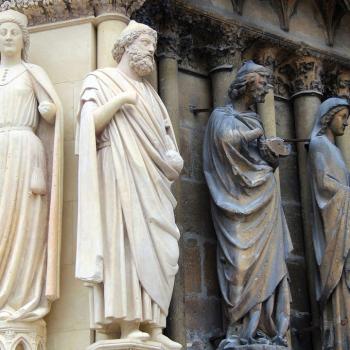Adopted by the Spirit
I was thinking on the subway the other day . . . you could just disappear in this city. So many people, everything is so anonymous. It’s true, we live in a world where the population is over six billion people and here we are, spinning around in space, as tiny from above as cars viewed from the window of an airplane. You and I, ultimately, we are dispensable—easily replaced by another human being willing to step in and take our place.
This is a rather unnerving thought, I have to say.
All along I’d had the impression that I was special, that God created me to be unique, that there was only one of me in all the world.
Turns out there are lots, and they are all taking the subway to the Bronx at 5:30 every evening. What a bummer.
This impression is only underscored if you take a look at the front page of the paper these last few weeks. What horrible devastation has hit South Asia, entire villages and cities completely destroyed, hundreds of families totally obliterated by the shaking of the earth, and bodies, bodies lined up in rows as far as the eye can see. This is the anonymity of human life taken to a new level, and it causes us to wonder, “What does my life mean? Am I dispensable and anonymous? How can the God of the Universe care one bit for my tiny life?”

www.janrichardson.com
It seems to me that part of the reason we gather here at church is the perpetual asking of those deep, human questions. These past weeks we’ve been talking about building a church, the construct in which we ask these questions together and listen hard for their answers. And we find ourselves now in the season of Pentecost, where we remind each other that we’re not doing the asking alone; that God’s Spirit is here, in and among us, animating our life together and helping us build a transformational community of diversity and prophetic witness to show the world that God’s dream for humanity can actually come to be.
Early in the life of the first church there was a leader, the Apostle Paul, who stepped in after the coming of the Spirit to help shape the church into the community it became. Paul wasn’t one of the first 12 disciples; instead he was more like the first pastor: he had to mediate disagreements, set policies, cast a vision, and lay the groundwork for basic Christian theology.
Last week in the book of Acts we read about the first church visited by the Spirit. Today, we’re jumping to the book of Romans. The book of Romans is unique among the writings of Paul to the early church. Most of his letters, you can read in the New Testament, address issues of church policy and the behavior of members, you know, tomes about church structure, the encouragement of those who were making good progress and the admonishment of those who were behaving badly.
In his letter to the Romans, however, Paul digs deep into some theological concepts, ideas that address those very questions we ask when we stand squeezed like sardines on the subway, wondering if our lives have any meaning at all. Today Paul uses a curious concept to talk about how the Spirit we received at the birth of the church ushers us in to relationship with God. He says it’s like…adoption.
In the liturgical rhythm of the church, today is Trinity Sunday, the one day of the church year when we focus on a theological concept. Preaching professor David Lose likes to say that Trinity Sunday is nobody’s favorite day to preach. I mean, you can understand: trying to explain or elaborate on this bizarre and controversial Christian doctrine of three persons in one God…well, not many of us are lining up to do that. But here we are in the season of the Spirit, and if we call ourselves Christians, we may want to take another shot at getting our minds around how the Spirit works to connect us to God and to each other. And, in fact, maybe Trinity Sunday is the best place to start. Lose says, “Perhaps the best way to approach the Trinity, then, is to think of it backwards. It is through the power of the Spirit that we can receive Jesus as God’s surprising and unexpected messiah who reveals to us the gracious and loving nature of the Father.”[1]
So here we begin, with the Spirit, who Paul says has brought us into relationship with God through a spirit of…adoption.
Why would Paul use this word to talk about our relationship with God? The concept of adoption doesn’t appear anywhere in the Old Testament text; in fact, when Paul was writing about it, he probably wasn’t thinking about a legal arrangement. Instead, he was probably thinking more relationally. In other words, I think the concept of adoption in the book of Romans has something to teach us about God. It would appear that God had a desire—a strong and persistent desire, to be in relationship with human beings, to be a parent to creation. And as we human beings bumbled along in life, spinning around the universe on this ball of energy, God was thinking . . . “I want these human beings to be more than just my creation. I want them to be my specially chosen children.” So, God decided to pursue adoption.
This was really a rather insignificant idea about God for me until I began the process of becoming an adoptive parent myself. When I think about what went into that decision, I know all of the sudden, as I never knew before, how much God loves me and you and each one of us, wholly and uniquely, with a desire that is overwhelming and immensely powerful.
Here’s what I know: it all begins with a desire to be in relationship. First it might be just a notion or an idea . . . wouldn’t it be nice to have a child to raise and nurture and love? I imagine that this thought must have crossed God’s mind at one time. At this stage in the quest for relationship it all seems so rosy, such a fond wish to open my life and to share it with another person, a little person who would be dependent on me for every little thing.
Then, I recall, once that idea has been planted, it starts to grow. That desire to be in relationship, to become a parent, starts to become all-consuming. I can remember that burning desire to find that child who would be part of my family. To adopt us, to bring us into his family of grace, I imagine God must have felt the same way.
And it’s curious to me that Paul chooses to use the word adoption, because I know, and perhaps many of you do as well, that after the initial idea and the lofty dreams about what adoption could mean, then reality sets in. The process itself is fraught with mishaps, pain and uncertainty. It involves filling in reams of paperwork, hunting down leads that meander painstakingly toward dead ends over and over. It involves painful experiences like holding babies I thought would join my family but in the end did not, it involves the risky, process of allowing my heart to swell with anticipation and excitement only to be deflated again and again.
See, I’ve come to know that adoption is a unique process of claiming relationship. In order to see it through to the end, to hopefully find the child who would be part of my family I was required to give up any and all control of the process. With every new possibility I would wonder, “Is this baby my child?” I didn’t know and I couldn’t control what happened.
Because I was there, motivated through the morass by the burning hope that there was a child who could be my own child, because I was there, this is how I know that God loves you and loves me. In order to adopt us, to welcome us as children, God had to give up control.
Can you imagine the God of the universe ceding control . . . to us? Can you imagine God giving up everything to find us and to bring us into God’s family? Can you imagine our all-powerful God, who could have with the point of a divine finger, assembled all the children of the world to do his bidding, instead, by the Spirit, inviting us into relationship, allowing you and me to choose whether we want to call ourselves children of God? Can you imagine God, not brokering a deal with us, but lavishing us with the riches of freely bestowed grace, piles and piles of grace, more than we ever expected and certainly more than we deserve—just because God wanted a relationship with us?
And then the moment finally arrives . . . the moment when that baby is in your arms and the papers are signed and you know for sure that no one will ever take this baby away from you. At that moment you become fully and completely a parent to that child and something unique and miraculous occurs . . . even though that child was not birthed by you, the miracle of adoption suddenly makes her all yours, to care for, to love, to build a relationship with, to carry on your family.
I recall standing in the judges chambers at the New Orleans District Court and hearing the judge say, “Now you know . . . by agreeing to become an adoptive parent to this child you are giving up any and all possibility of giving her back. You cannot come back to this court in 13 years and ask to trade her in. With the signing of this paper, her birth certificate is reprinted with your name as her birth parent; she becomes totally and legally your child; you are responsible for her and as a member of your family, she is responsible for you.”
Adoption by the Spirit.
This is what God willingly subjected himself to . . . the surrender of rights to take us on as true and legal children, adopted in love and firmly and totally established as members of God’s family. God cannot return us. Once we were no people, now, with our adoption through the grace of Jesus Christ, we have become God’s people, loved and chosen and cared for with great tenderness and mercy.
It seems more and more, as we grow together and learn to love and care for each other, that there never was a day in our lives when Hannah was not my child and I was not her mother. Sure, she was not born biologically to me, but in a unique and wonderful way, she was carefully chosen, specially placed, uniquely loved into our family, and because she is adopted she need never wonder if she was wanted.
When we think of the Spirit, this lively force that animates our community and brings hope and life to this institution we call the church, we also take this Sunday, Trinity Sunday, to remember that the Spirit of God has invited us to join God’s family. Through the miraculous gift of adoption, we know without a doubt that God wanted me; God wanted you. God paid a great price to find us and to bring us into his family. God delights in loving us and providing for us. We are precious children of God.
And more than that, God is building, through the miracle of the Spirit, a family of faith unlike no other human community. As you’re adopted and I’m adopted and we’re all adopted, we—God’s family—resemble a funny collection of folks who look different from each other, who come from different backgrounds, who think differently, who bring with us varied experiences and unique gifts. But, adopted by the Spirit, we are now gathered here and form a family unlike any other, commissioned now with the opportunity and possibility of showing the world the potential and possibility that God imagines for the whole human family.
Ever get on the subway going toward the Bronx at 5:30 in the evening and wonder if your little life means anything in the big picture? On this Trinity Sunday, a day of lofty theological pondering, we have only to remember this one thing: we have been adopted by the Spirit, Paul says. God sees beyond the throng of people bustling through a big city. God sees deep into the mind-boggling tally of anonymous deaths in Nepal. God sees into each individual heart, claims it for his own and loves it, loves you, like only a parent could.
Adoption: that unique and wonderful experience of risky love, has been extended to you and me. We’ve been adopted by the Spirit and we—the church together—are the messy, wonderful, beautiful…family of God.
Amen.
[1] David Lose, Professor of Preaching at Luther Seminary in St. Paul, Minnesota, from his comments on the Trinity Sunday reading for Year B (John 3:1-17) at the Good Preacher website.















